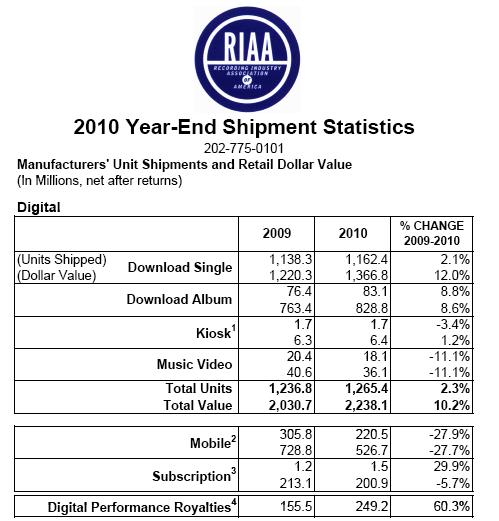I just wrote a huge article about Rdio and MOG, and have covered Spotify quite a bit. When you look at the 9 million Spotify users in the EU as well as the great interest in the service in the US, you might think that there is a huge amount of money in this rapidly growing sector.
You would be wrong. Spotify is doing everything possible to force more than the less-than-10% (i.e. under 1 million) of users who actually pay for the service to abandon the free version, and estimates peg the US subscription market between 1.5 and 2 million paying users largely between Rhapsody, Rdio and MOG. Rhapsody got spun out from RealNetworks last year and quickly added ~100,000 subscribers, but has run flat since.
Worse still, in spite of increasing subscriber rolls to 1.5 million last year, the RIAA actually saw a decline in paid royalties from music subscription services! Here is some info from HypeBot:
Music streaming services like MOG, Rdio and Spotify may be the talk of the industry, but digital radio from Pandora to Sirius XM surpassed them in royalties paid to musicians and rightsholders for the first time last year. According to RIAA numbers, performance royalties from digital radio services grew 60% from $155.5 million to $249.2 million in 2010. Paid music subscription plans revenue fell 5% from $213 million to $200.9 million million despite subscriber growth from 1.2 million to 1.5 million.
“The subscription services have been relatively flat for the five or six years we’ve been tracking them,” said Joshua Friedlander, the RIAA’s vice president of research and strategic analysis.
The dominate force in digital music revenue remained paid single track downloads. They grew 12% to $1.37 billion and album downloads were up 9% to $828.8 million . Ringtones and ringback sales fell 28% to $526.7 million. Overall digital downloads alongside other digital music revenue grew 3% last year to $3.21 billion.
Similar information is found at MusicAlly:
Music subscription services had 1.5 million paying users in the US last year, up from 1.2 million in 2009. That’s according to new figures from the RIAA, which says revenues for these services still fell from $213 million in 2009 to $201 million in 2010. The RIAA’s report also reveals the continuing decline in mobile music sales, which fell from 306 million units in 2009 to 221 million in 2010, with ringtones down 41%, ringback tones down 26% and even full-track music downloads down 23%. 1.16 billion download singles were sold in the US in 2010 – up 2.1% year-on-year – for a value of $1.37 billion, up 12% as higher prices on iTunes took effect. Download album units increased from 76.4 million in 2009 to 83.1 million in 2010, with their value increasing from $763.4 million to $828.8 million in the same period.
If you want more details you can read the RIAA Report.
Much has been made about the concessions Spotify is making to gain the US market, and I am sure that this report highlights many of the issues they are having: record companies want to see a return for letting folks listen to whatever they want, whenever they want. I mean, the new Beastie Boys album launched Tuesday, and you can listen to it all you want on Rdio already. The problem, as many have said before, is getting people to see the value of not actually ‘owning the music’ and signing up. It has taken me a while, but I listen to Rdio on my Android phone and iPod Touch as much as I listen to stuff from my iTunes library!
What about you? What are your thoughts on ‘on demand’ sites like Rdio versus ‘internet radio’ such as Pandora?

